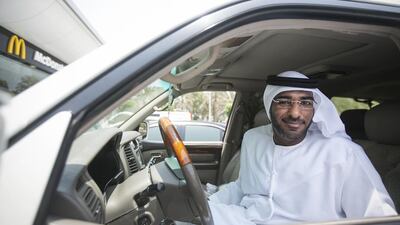ABU DHABI // The new petrol price regulation policy has met with mixed reactions from motorists.
Many fear the decision will mean a further cost-of-living burden but others welcomed the long-term effect it would have on the environment and economy.
Ali Al Qubaisi, an Emirati, fears cutting subsidies will mean a rise in prices at the pumps.
“I think it is a bad move,” said the 40-year-old, of Abu Dhabi. “Some people do not have enough money to fill their tanks as it is.”
Should pump petrol prices increase it could affect those who are already feeling the effects of the high cost of living, he said.
“It is better for everything to be reduced,” said Mr Al Qubaisi, who owns a four-wheel-drive Lexus.
Karim Smile, 32, of Abu Dhabi, felt there were both negatives and positives in the announcement.
“I don’t know if it is either good or bad,” he said. “But I do think it is fair.
“It will reduce traffic and encourage public transport.”
Mr Smile, who works as a general manager, spends Dh500 a week on petrol for his Jeep Cherokee.
He expects an increase in his weekly fuel bill from August 1, when the new pricing policy comes in to play.
“However, it will help the environment and stop people using high-powered cars,” he said.
Saif Al Mansoori, a 28-year-old Emirati businessman, drives a Range Rover.
He believed the announcement was a positive move, as it would help sustain the environment and encourage people to buy hybrid vehicles rather than gas-guzzling cars.
“It will bother Emiratis less,” he said. “I feel expatriates will feel the most affected.”
Troy Alton, an Algerian-American expatriate living in Abu Dhabi, was disappointed by the news.
“Of course it is a bad move,” he said.
However, he believed cost of fuel represents a small percentage of an average income in the UAE and feels deregulating prices would not have a notable effect on resident’s monthly pay packet.
“People enjoy high salaries here,” said the 43-year-old, who drives a Mercedes G63.
Ahmed Al Dhaheri, who works for the Ministry of Presidential Affairs in Abu Dhabi, spends Dh400 a week on petrol for his car.
“It will not impact on me too much,” he said. “I think the news is really bad for us.
“Not for the locals but for the expatriates,” he said.
Expatriates, he said, felt the pinch more as they had moved to the country to save money.
Hind Al Dhary, a 30-year-old Emirati, drives a Nissan Patrol and spends Dh250 a week on petrol.
The Abu Dhabi human resources worker is unconcerned about the news.
“I don’t think it will affect me too much,” she said.
Dubai-based Syed Maqbool, an operations assistant, drives to and from Abu Dhabi everyday for his job and fills the tank on his Kia car once a day.
His petrol is paid for by his managers so Mr Maqbool, a 30-year Indian, said the news would not affect him.
jbell@thenational.ae
_________________
More on UAE petrol price deregulation:
› UAE ministers and industry chiefs praise petrol price deregulation
› UAE fuel price hike will encourage public transport use, say experts
› Petrol costs in UAE among lowest in the world ahead of August hike
› Petrol price policy to create 'a safer and cleaner UAE', environmentalists say

